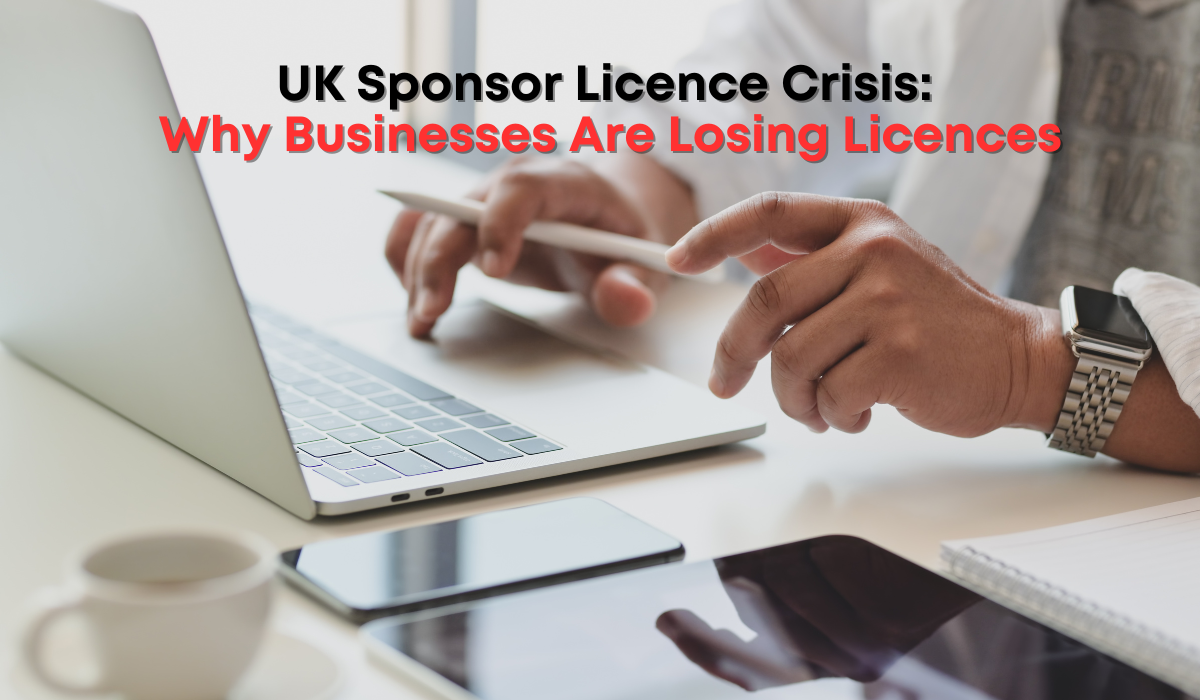The UK’s immigration landscape is undergoing a seismic shift, with a stark rise in sponsor licence suspensions and revocations shaking the foundations of businesses reliant on international talent. As compliance standards tighten under Home Office scrutiny, employers face mounting challenges to sustain their workforce while adhering to increasingly rigorous regulations. This article explores the pressing realities of sponsor licence compliance, the reasons behind the crackdown, and the implications for key sectors and the wider economy.
The Importance of Sponsor Licences
The sponsor licence system is a cornerstone of the UK’s immigration framework, enabling businesses to hire skilled workers from overseas. This licence grants employers the authority to issue Certificates of Sponsorship (CoS), which prospective employees use to apply for Skilled Worker visas.
However, holding a sponsor licence comes with substantial responsibilities. Employers must uphold strict compliance standards, maintaining detailed records, monitoring employees, and promptly reporting changes to the Home Office. Failure to meet these obligations can result in severe consequences, including licence suspension or revocation, recruitment freezes, legal battles, and reputational damage.
The Rising Wave of Suspensions and Revocations
2024 has seen an unprecedented escalation in sponsor licence compliance actions. Home Office data reveals a dramatic 109% increase in suspensions and a 51% rise in revocations compared to 2023. In the second quarter of 2024 alone, 1,023 employers lost their licences—a staggering leap from 519 in the first quarter.
This trend reflects the government’s intensified focus on curbing illegal working and misuse of the sponsorship system. Recent reforms, such as the introduction of 10-year licence extensions from April 2024, have freed up Home Office resources, leading to a surge in compliance audits. These measures, coupled with heightened penalties for employing illegal workers—now £45,000 per offence—underscore the government’s commitment to immigration control.
The Impact on Businesses and Workers
The loss of a sponsor licence is devastating for both businesses and their sponsored employees. Employers face operational paralysis, reputational harm, and the daunting task of addressing compliance failures. For workers, the consequences are equally dire: without a sponsor, they risk losing their right to live and work in the UK within 60 days.
Key sectors such as healthcare, construction, and creative arts, which rely heavily on international talent, are particularly vulnerable. The care home industry, already grappling with modern slavery concerns, has been hit hardest, with numerous licences revoked due to non-compliance. The resulting skill shortages exacerbate existing workforce gaps, undermining critical services and economic growth.
Why Are Licences Being Suspended?
Most suspensions stem from common compliance failures, including:
- Failure to Report Changes: Sponsors must report changes in job titles, pay, or work locations promptly. Delays or omissions can trigger audits and suspensions.
- Poor Record Keeping: Sponsors are required to maintain comprehensive records, including right-to-work checks and visa documentation. Gaps in record-keeping are a major compliance risk.
- Failure to Respond to Audit Demands: Non-compliance with Home Office requests for information or documentation can result in immediate suspension.
Additionally, unethical practices, particularly in the care sector, have drawn scrutiny. Reports of modern slavery involving care workers have surged, prompting stricter enforcement to combat exploitation.
Critical Sectors at Risk
The rise in sponsor licence revocations is compounding skill shortages across key industries:
- Healthcare: With an ageing population and increasing demand for care services, the loss of international carers and healthcare professionals is causing a crisis in the sector.
- Construction: Essential roles such as bricklayers, roofers, and carpenters remain in short supply, delaying critical infrastructure projects.
- Creative Arts: Specialised roles, including ballet dancers and orchestral musicians, are struggling to attract talent, threatening the UK’s cultural legacy.
- Agriculture and Fisheries: Labour shortages in rural and coastal economies are disrupting food supply chains and local industries.
- Life Sciences: The UK’s reputation as a leader in scientific research is under threat due to a lack of skilled professionals in fields such as nuclear science and biotechnology.
Navigating the Compliance Minefield
To safeguard their sponsor licences, businesses must adopt a proactive approach to compliance:
- Conduct Regular Audits: Frequent internal checks help identify and address compliance gaps before they escalate.
- Maintain Robust HR Systems: Accurate records and prompt reporting of changes are crucial to meeting Home Office standards.
- Train Key Personnel: Ensuring HR teams are well-versed in sponsorship duties is essential for sustained compliance.
- Prepare for Audits: Sponsors should be ready for announced or unannounced Home Office visits at any time.
- Monitor Remote Work Arrangements: Sponsors must clearly document and justify hybrid or remote work patterns to remain compliant.
What to Do If Your Licence Is Suspended
A suspension is a serious but not insurmountable setback. Employers should:
- Understand the Issues: Carefully review the Home Office’s findings to identify areas of non-compliance.
- Rectify Problems: Implement corrective measures, update records, and address procedural shortcomings.
- Seek Legal Advice: Engage experienced immigration solicitors to prepare a robust response and representation.
Conclusion: Staying Ahead of Compliance Challenges
The rising tide of sponsor licence suspensions and revocations underscores the need for vigilance and adaptability in a rapidly changing regulatory environment. Businesses must prioritise compliance to protect their ability to hire international talent and mitigate the risks of operational disruption. By investing in robust systems, training, and expert advice, employers can navigate these challenges and remain competitive in a global market.
For further guidance on sponsor licence compliance or assistance with audits and appeals, consult a specialist immigration solicitor to ensure your business remains on the right side of the law.
Get in touch: For a comprehensive understanding of your options or queries on UK immigration matters, contact GigaLegal Solicitors at 02074067654 or click here to book a no-obligation consultation with an immigration expert.


